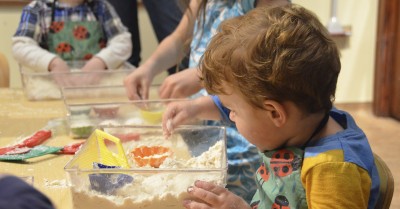The early years of a child’s life are critical for developing a foundation for lifelong learning and success. Preschoolers are naturally curious and imaginative, making it the ideal time to introduce innovative learning activities that foster creativity, curiosity, and a love for discovery. Let’s explore how activities like sensory bins, storytelling with props, outdoor nature hunts, and simple science experiments can significantly benefit preschoolers’ growth and development.
Sensory Bins for Exploratory Learning
Sensory bins provide a hands-on approach to learning that engages multiple senses simultaneously. By interacting with a variety of textures, colors, and materials, children develop cognitive skills such as sorting, classifying, and problem-solving. These activities also support the development of fine motor skills as children manipulate small objects, pour, scoop, and sift through the materials. Sensory play stimulates curiosity as children explore the properties of different substances, fostering an early interest in scientific concepts and inquiry.
Storytelling with Props: A Gateway to Language and Imagination
Integrating props into storytelling sessions transforms passive listening into an interactive and immersive experience. This approach to storytelling captivates children’s attention, enhancing their listening skills and comprehension. By handling props, children are encouraged to retell stories, boosting their confidence in speaking and storytelling. This active participation supports language development, vocabulary building, and the understanding of narrative structures, crucial for literacy skills. Moreover, using imagination to animate props fosters creativity and emotional expression, allowing children to explore different perspectives and empathize with characters.
Try Open-Ended Games
There are numerous ways to spice up the bedtime reading routine for your kids while also encouraging their creativity. Even if kids appear to like reading the same stories over and again, consider making it more entertaining by leaving the conclusion to their imagination. To further maintain their interest and attention in the narrative, you can also ask them to come up with a new title and write a new introduction. This is an innovative and among the best activities to encourage curiosity in kids.
Blocks and legos are excellent options to start with young children. But when children become older, what comes next? There are some fantastic opportunities like origami, Sudoku, and building games. You need to research and see what games can push your child’s limit and help him/her evolve brain functions .
Always Encourage Exploration
Let your preschooler explore and discover new things around them. You can encourage this by giving them plenty of opportunities to explore their home, school, and environment. You can take them on a nature walk or a fun trip to the local park.
Let them play and explore their surroundings and offer age-appropriate learning materials and resources they can use to further explore with a more hands-on approach.
Outdoor Nature Hunts: Fostering Curiosity and Observational Skills
Outdoor nature hunts are an exciting way to bring learning outside, encouraging children to engage with their environment actively. These activities nurture a sense of wonder about the natural world as children search for specific items, observe wildlife, and explore different ecosystems. Nature hunts promote observational skills, attention to detail, and categorization skills as children collect, compare, and discuss their findings. This hands-on exploration also supports physical development through walking, climbing, and using fine motor skills to handle found objects, enhancing their overall physical well-being and coordination.
Simple Science Experiments: Sparking Wonder and Problem-Solving Skills
Simple science experiments offer a platform for inquiry-based learning, where children can ask questions, predict outcomes, and observe results. These activities demystify science, making it accessible and enjoyable for young learners. Experiments such as mixing colors, creating volcanoes with baking soda and vinegar, or growing plants from seeds introduce basic scientific principles and the scientific method in a fun and engaging way. Participating in science experiments develops critical thinking and problem-solving skills as children learn to observe, hypothesize, experiment, and draw conclusions from their observations.
Why Preschool at Rising Stride views Creativity and Imagination as Vital
The reason that preschool at Rising Stride Child Care Centers views imagination and creativity as critical for preschoolers, is because of the inherent benefits of those traits for young children, including:
- Enhancing their cognitive skills: Creativity and imagination stimulate children’s thinking, problem-solving, memory, language, and literacy skills. They also help children learn about different concepts, such as shapes, colors, numbers, patterns, etc.
- Boosting their social and emotional skills: Creativity and imagination foster children’s self-expression, confidence, empathy, cooperation, and communication skills. They also help children cope with their emotions, such as fear, anger, sadness, etc.
- Supporting their physical development: Creativity and imagination encourage children’s fine and gross motor skills, as well as their sensory awareness and exploration. They also help children develop their hand-eye coordination, balance, strength, and flexibility.
In Conclusion
Innovative learning activities for preschoolers, such as sensory bins, storytelling with props, outdoor nature hunts, and simple science experiments, are invaluable tools for unlocking creativity and curiosity. These activities not only foster essential developmental skills but also instill a love for learning that children will carry with them into their formal schooling years and beyond. By embracing these engaging educational practices, educators and parents can provide preschoolers with a rich, stimulating environment that encourages exploration, discovery, and the joy of learning.

